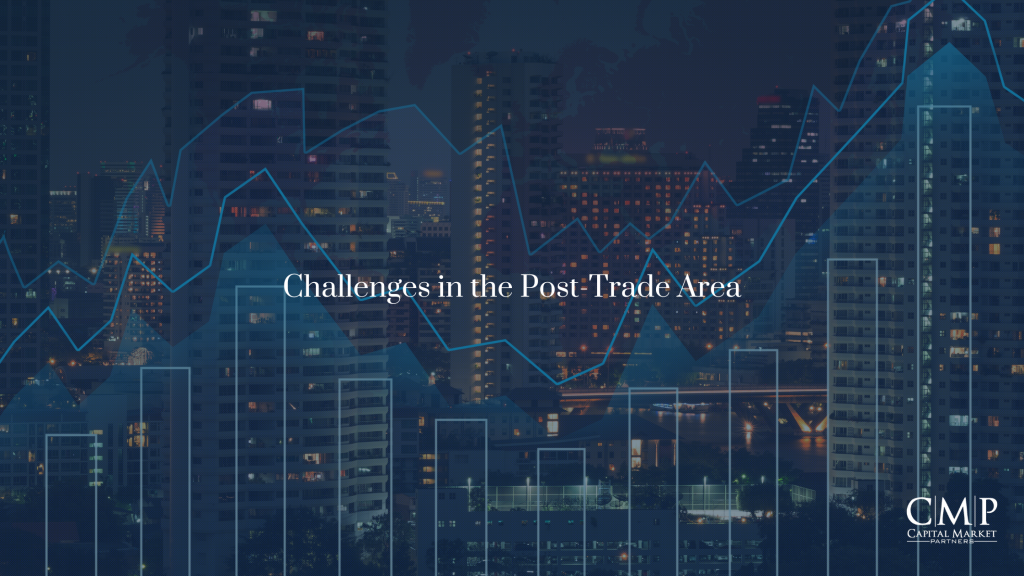Challenges in the Post-Trade Area

By Peter Jørn Jensen, Director | The 15th of March 2024
The post-trade area of the capital markets industry faces numerous challenges in today’s dynamic financial landscape. From clearing and settlement to risk management and regulatory compliance, ensuring smooth and efficient post-trade processes is crucial for maintaining market integrity and investor confidence. Below are some of the key challenges confronting this vital aspect of the capital markets, including the transition to a T+1 settlement cycle:
Complexity and Fragmentation: The capital markets ecosystem is characterized by a multitude of participants, including exchanges, clearinghouses, custodians, brokers, and institutional investors. The sheer complexity and fragmentation of this ecosystem pose significant challenges in achieving seamless post-trade operations, often leading to inefficiencies, delays, and increased operational costs.
Legacy Systems and Infrastructure: Many market participants still rely on outdated legacy systems and infrastructure, which were not designed to handle the volume and complexity of modern trading activities. Integrating new technologies and upgrading legacy systems without disrupting ongoing operations presents a considerable challenge for firms looking to enhance their post-trade capabilities.
Regulatory Compliance: Regulatory requirements in the post-trade space continue to evolve, driven by initiatives aimed at enhancing market transparency, mitigating systemic risk, and protecting investors. Compliance with regulations such as MiFID II, EMIR, Dodd-Frank, SFTR, and the transition to T+1 settlement requires significant resources and expertise, placing a strain on market participants’ compliance functions and operational workflows.
Technology Upgrades: Adopting T+1 settlement requires upgrading and modernizing existing trading and settlement systems to support accelerated trade confirmation, clearing, and settlement processes. Market participants must invest in robust technology solutions capable of processing transactions swiftly and accurately while ensuring compliance with regulatory requirements and risk management standards.
Risk Mitigation: Shortening the settlement cycle for securities while maintaining a T+2 settlement cycle for FX trades increases operational, credit, and liquidity risks for market participants. Effective risk mitigation strategies, including real-time monitoring, collateral management, and margining mechanisms, are essential to manage risks associated with the discrepancy in settlement cycles between securities and FX transactions.
Operational Resilience: The increasing digitization of post-trade processes exposes market participants to cybersecurity threats, including data breaches, ransomware attacks, and insider threats. The Digital Operational Resilience Act (DORA) is part of the digital finance package, a package of measures to further enable and support the potential of digital finance in terms of innovation and competition while mitigating the risks arising from it. Safeguarding sensitive financial information and protecting critical infrastructure from cyber threats requires robust cybersecurity protocols, employee training, and continuous monitoring and threat detection mechanisms. Firms must develop and test business continuity and disaster recovery plans to minimize the impact of operational disruptions on post-trade operations and market functioning.
In conclusion, the post-trade area of the capital markets industry is confronted with a myriad of challenges ranging from technological complexity and regulatory compliance to operational resilience. Addressing these challenges, including the transition to a T+1 settlement cycle, requires collaborative efforts among market participants, regulators, and technology providers to innovate, streamline processes, and enhance the resilience and efficiency of post-trade operations in an increasingly interconnected and dynamic financial ecosystem.
About CMP
Our name, Capital Market Partners, reflects what we define as our core service: Business understanding based on extensive experience in applying technology in the capital market area.
As a business partner, we offer consulting services based on our combination of business understanding and IT know-how. Our work analyzes, implementation of IT systems and other projects supports strategic decisions at different levels in complex business contexts.
